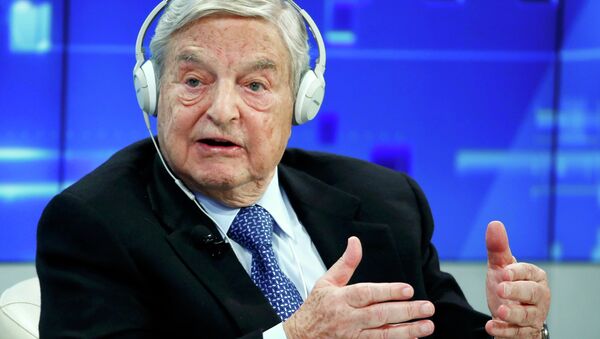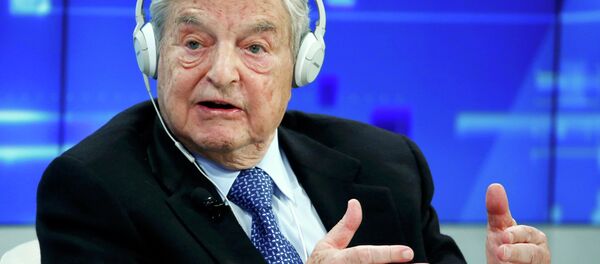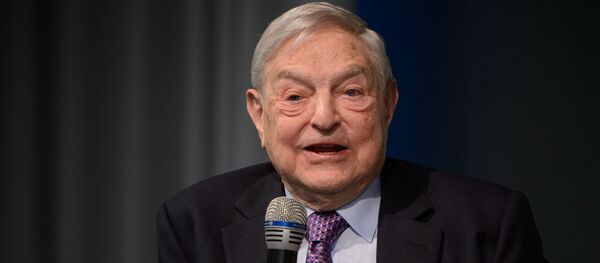Hungarian Prime Minister Viktor Orban appears to be the last obstacle in the way of George Soros's plan to "reconstruct" Europe, experts say.
On Wednesday, Reuters reported that the European Commission (EC) increased legal action against Budapest over "restrictions on foreign funding," which are "likely to affect civil society groups funded by the billionaire investor George Soros." According to the official statement, EC reserves the right to "refer the case to the Court of Justice of the EU."
Hungarian NGO Law 'Targeting George Soros'
A Hungarian law passed in June 2017 stipulates that nongovernmental organizations (NGOs), which receive more than 24,000 euros a year from abroad should provide a list of their external sponsors and undergo a special registration as "organizations benefiting from foreign financing."
According to the Hungarian prime minister, the legislation is aimed at targeting money laundering and terrorism funding. However, The Atlantic writes that "the law is… widely seen as targeting George Soros" in the first place.
The law requires foreign accredited universities to provide educational services in the countries of their origin and bans them from awarding Hungarian diplomas in the absence of an agreement between Hungary and a country of accreditation.
Although the CEU is accredited in the United States it does not provide any educational services there. Besides, there is no legally binding bilateral agreement between Budapest and Washington, as required by the new law.
In the eyes of the European Commission the NGO and education laws contradict the bloc's democratic principles. Thus, in July 2017 the EU issued a one-month ultimatum to Hungary, threatening Budapest with possible sanctions in court.
2015 'Soros Plan': Flooding Europe With Migrants
However, there is yet another "apple of discord" between the Hungarian government on the one side and the influential American billionaire and his EU allies on the other.
The country's ruling Fidesz party has recently launched a "national consultation" on the so-called "Soros plan" allegedly aimed at flooding Europe with migrants. The national consultations have been held in Hungary since 2011: The country's government sends questionnaires seeking to determine the popular opinion on the most burning issues.
"The European Commission stops just short of saying that they carry out the Soros plan… but all their steps and ideas with regard to migration point in this direction," Fidesz's vice chairman Lajos Kosa said as quoted by Reuters.
Speaking about the "Soros plan" the Hungarian ruling party refers to the billionaire's article "Rebuilding the Asylum System" published on September 26, 2015, during the peak of the migrant crisis on the old continent.
In his op-ed Soros outlined what he called "a comprehensive plan," which envisaged that the EU had to accept "at least a million asylum-seekers annually for the foreseeable future" and "share the burden fairly."
The billionaire insisted that "the EU should provide €15,000 ($16,800) per asylum-seeker for each of the first two years to help cover housing, health care, and education costs" and offer "adequate funding to Lebanon, Jordan, and Turkey to support the 4 million refugees currently living in those countries."
In the end of his article Soros lambasted Viktor Orban's approach to the refugee crisis, claiming that the Hungarian prime minister's vision "subordinates the human rights of asylum-seekers and migrants to the security of borders" and thus "threatens to divide and destroy the EU."
Why Viktor Orban's Positions Remain Strong
Despite the attacks from Brussels and the American billionaire, Viktor Orban's political positions remain strong "because he acts as an active champion of national interests on the issue of migration," Alexander Stykalin, a researcher at the Institute of Slavic and Balkan Studies of the Russian Academy of Sciences (RAS) told RT.
According to the Russian academic, "if there were elections in the country, [Orban] would most likely win again."
For her part, Russian political analyst Anna Aryamova pointed out that Orban's concerns about the migration problem are quite justified: "This mass migration spells danger for European countries, [in particular] for their economy and social sphere."
She explained that "thus Europe is paying for the aggressive US policy" in the Middle East and North Africa. The migrant flow from the countries destabilized by Washington plays into America's hand, according to the political analyst: The tension simmering in the wartorn regions is being exported to Europe, not the US.
"Soros's [Open Society] Foundations is a global project that is seeking to influence global political processes," Aryamova told RT. "Apart from this fund, there are many American organizations operating in Europe, but Soros is managing the largest financial flows and therefore he is attracting the most attention."





